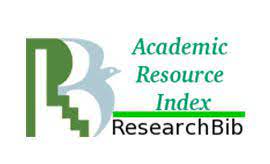PROGRAMMATIC SYSTEM FOR INTERACTIVE REPRESENTATION OF SCIENTIFIC INSTITUTION RESULTS
DOI:
https://doi.org/10.51707/2618-0529-2022-24-11Keywords:
ontological engineering, knowledge base, interactive document, domain ontology, information technology.Abstract
Our time is characterized by rapidly increased information quantity. The volumes of accumulated data become so large that the manual handling of this data by experts of certain subject areas becomes almost impossible. In such circumstances, it is extremely important to develop effective tools that could provide users the information, presented in the form of large arrays of spatially and thematically distributed information resources (documents). An example of an array of spatially and thematic distributed documents is the set of information that characterizes scientific achievements of the institutions of the National Academy of Sciences of Ukraine. Such information may be useful for a wide range of users, but can bring especially great benefits to young researchers — students, engaged in scientific and educational activities. The article proposes the approach to build the information and analytical system designed to provide the access to an array of information about the achievements of scientific institutions for young researchers. The system is characterized by flexible ontology driven architecture, which allows dynamical modifying of its composition and structure for the need of a particular user or project. The article describes the architecture of the ontology driven lexicographic system, based on which the system of interactive representation of achievements is constructed. In addition, the structure and interrelations of the software components that are part of the system are described. The software system is being developed within the framework of research “Interactive Base of Knowledge of Scientific Achievements of the Institutions of National Academy of Science of Ukraine” by the researchers of National Centre “Junior Academy of Sciences of Ukraine”.
References
Podlipayev, V. A., & Strizhak, A. E. (2018). Integratsiya informatsionnykh resursov razlichnoy prirody v setetsentricheskoy srede na osnove kategorii transdistsiplinarnosti [Integration of informational resources of different kinds based by category of transdisciplinarity]. Systemy Ozbroiennia i Viiskova Tekhnika — Weapon Systems and Military Equipment, 3 (55), 85–94. DOI: https://doi.org/10.30748/soivt.2018.55.12 [in Russian].
Stryzhak, O. Ye., & Kucherov, O. P. (2013). Formuvannia operatsiinoho seredovyshcha informatsiino-analitychnykh system na osnovi ontolohii [Creating operational environment of information-analytical systems based on ontologies]. Matematychne Modeliuvannia v Ekonomitsi — Mathematical modelling in economics, 3, 40–48 [in Ukrainian].
Rivera, A. C., Tapia-Leon, M., & Lujan-Mora, S. (2018). Recommendation Systems in Education: A Systematic Mapping Study. Proceedings of the International Conference on Information Technology & Systems (ICITS 2018). (pp. 937–947). Cham : Springer. DOI: https://doi.org/10.1007/978-3-319-73450-7_89
Ansari, M. H., Moradi, M., NikRah, O., & Kambakhsh, K. M. (2016). CodERS: A hybrid recommender system for an E-learning system. 2016 2nd International Conference of Signal Processing and Intelligent Systems (ICSPIS). (pp. 1–5). IEEE. DOI: https://doi.org/10.1109/ICSPIS.2016.7869884
Ragab, A. H. M., Mashat, A. F. S., & Khedra, A. M. (2012). HRSPCA: Hybrid recommender system for predicting college admission. 2012 12th International Conference on Intelligent Systems Design and Applications (ISDA). (pp. 107–113). IEEE. DOI: https://doi.org/10.1109/ISDA.2012.6416521.
Kong, X., Boll, S., & Heuten, W. (2013). Towards recommender systems supporting knowledge sharing and transfer in vocational education and training. 2013 Second International Conference on E-Learning and E-Technologies in Education (ICEEE). (pp. 25–30). IEEE. DOI: https://doi.org/10.1109/ICeLeTE.2013.6644342.
Shapovalov, Ye., Tarasenko, R., Usenko, S., Shapovalov, V., Andruszkiewicz, F., & Dolhanczuk-Sródka, A. (2021). Ontological information system for the selection of technologies for the treatment and disposal of organic waste: engineering and educational aspects. Desalination and water treatment, 236, 226–239. DOI: https://doi.org/10.5004/dwt.2021.27689
Shapovalov, Ye. B., Shapovalov, V. B., Tarasenko, R. A., Usenko, S. A., & Paschke, A. (2020). A semantic structuring of educational research using ontologies. CEUR Workshop Proceedings, 2879.
Shirokov, V. A. (2017). Yazyk. Informatsiya. Sistema: Transdistsiplinarnost v lingvistike [Language. Information. System: Transdisciplinarity in linguistics]. Kiyev : Palamarium Academic Publishing [in Russian].
Stryzhak, O., Prykhodniuk, V., Popova, M., Nadutenko, M., Haiko, S., & Chepkov, R. (2021). Development of an Oceanographic Databank Based on Ontological Interactive Documents. Lecture Notes in Networks and Systems, 97–114. DOI: https://doi.org/10.1007/978-3-030-80126-7_8
Nadutenko, M., Prykhodniuk, V., Shyrokov, V., & Stryzhak, O. (2022). Ontology-Driven Lexicographic Systems. In Advances in Information and Communication. FICC 2022. Lecture Notes in Networks and Systems, 204–215. DOI: https://doi.org/10.1007/978-3-030-98012-2_16
Malishevskiy, A. V. (1998). Kachestvennyye modeli v teorii slozhnykh sistem [Qualitative models in the theory of complex systems]. Moscow : Nauka. Fizmatlit [in Russian].
Downloads
Published
How to Cite
Issue
Section
License
Copyright (c) 2022 Scientific notes of Junior Academy of Sciences of Ukraine

This work is licensed under a Creative Commons Attribution 4.0 International License.













